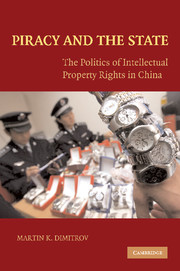Book contents
- Frontmatter
- Contents
- List of Tables
- List of Figures and GIS Maps
- Acknowledgments
- List of Abbreviations
- I INTRODUCTION
- 1 Intellectual Property and the State
- 2 Regulating the Quality of Enforcement
- II THE ORGANIZATION OF THE STATE: IPR ENFORCEMENT OPTIONS
- III THE STATE IN ACTION: THE POLITICS OF IPR ENFORCEMENT IN CHINA
- IV CONCLUSION
- Glossary of Selected Chinese Terms
- Index
1 - Intellectual Property and the State
Published online by Cambridge University Press: 06 November 2009
- Frontmatter
- Contents
- List of Tables
- List of Figures and GIS Maps
- Acknowledgments
- List of Abbreviations
- I INTRODUCTION
- 1 Intellectual Property and the State
- 2 Regulating the Quality of Enforcement
- II THE ORGANIZATION OF THE STATE: IPR ENFORCEMENT OPTIONS
- III THE STATE IN ACTION: THE POLITICS OF IPR ENFORCEMENT IN CHINA
- IV CONCLUSION
- Glossary of Selected Chinese Terms
- Index
Summary
In 2001, I found myself in Beijing, speaking to a private investigator about cigarette counterfeiting in China. I already knew something about the scale of the problem. What I had not expected was the investigator's blunt cynicism about the raids he helped organize. “The work we do is simple,” he said. “We are hired by a tobacco company to find out who is faking their cigarettes, we investigate whatever leads our paid informants give us, we find a government agency willing to enforce, and then we go along with its representatives to raid the site. Counterfeiting is so entrenched in China that we're able to raid the same place over and over, usually with success. Last year, for example, we organized more than a hundred raids in Da'ao alone.” Da'ao is a nondescript village of twenty thousand inhabitants in Raoping county of Guangdong, a province that is known as a center for the production of counterfeit and pirated goods. “Did the hundred raids solve the problem?” I asked. He smiled. “You know,” he said, “raids are not always effective. If we pay a bribe, the agency will conduct a raid, but that doesn't mean they seize or destroy the fake cigarettes. Sometimes, the goods disappear right before the raid. Sometimes, the goods are seized, but then sold back to the counterfeiters. It is very rare for fakes to be destroyed. So, we pay the agencies to raid the same counterfeiters again and again.”
- Type
- Chapter
- Information
- Piracy and the StateThe Politics of Intellectual Property Rights in China, pp. 3 - 32Publisher: Cambridge University PressPrint publication year: 2009

